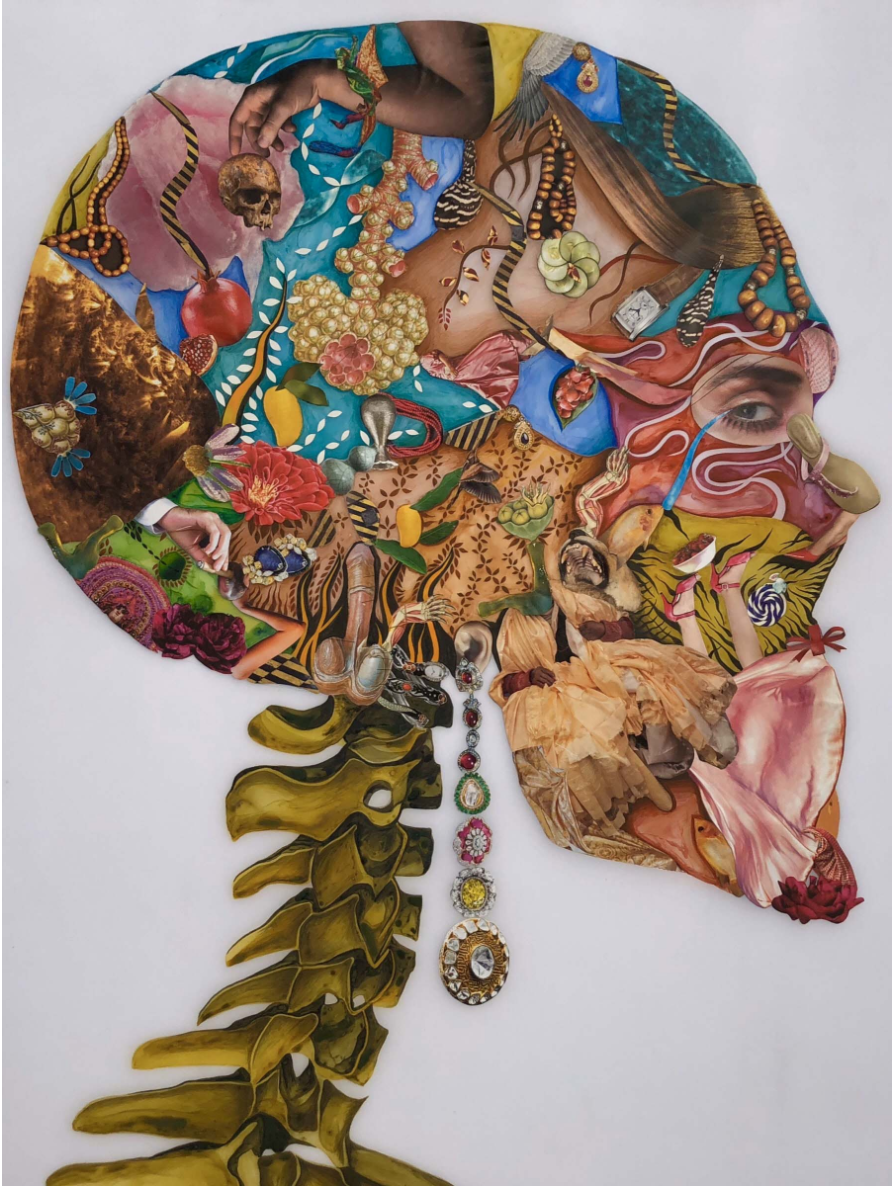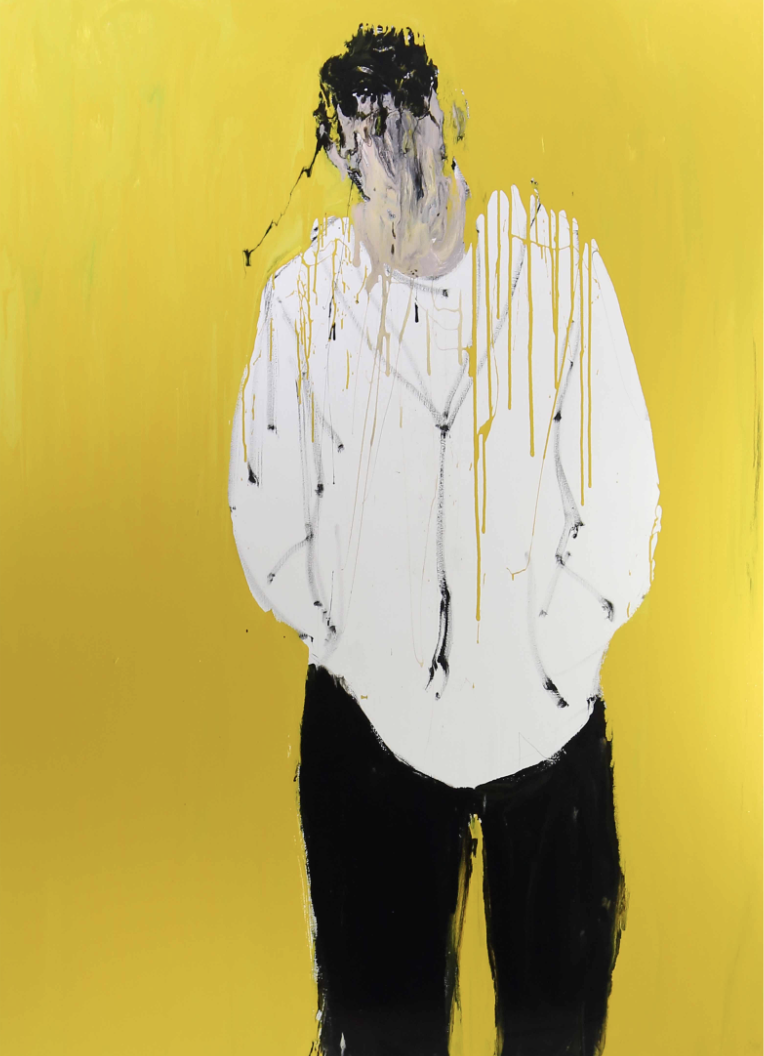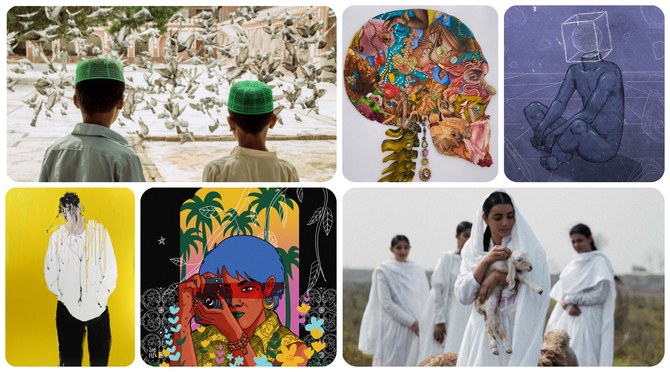RAWALPINDI: It’s a striking image of four women in synchronized clothing, with one holding a new-born lamb.
“It’s raw, real and the shot was completely happenstance,” Lahore-based photographer Aleena Naqvi told Arab News on Monday while describing “Mary and the Lamb.”

"Mary and the Lamb" by Aleena Naqvi is on sale during the Prints for Pandemic Relief (PfPR) fundraiser on May 1, 2020. (Photo courtesy: PfPR)
The artwork is part of several coveted pieces on display at the Prints for Pandemic Relief (PfPR) fundraiser – a locally conceptualized online initiative to provide relief efforts for the COVID-19 outbreak across Pakistan.
Naqvi says it’s one of her favorite works and explains how “it all came together.”

The photograph shows "Two Friends at the Shrine of Mian Meer Sahib," an artwork by Nade Aly, on sale during the online Prints for Pandemic Relief (PfPR) fundraiser which started on May 1, 2020. (Photo courtesy: PfPR)
“That image was shot in Sialkot when I was working on an assignment for a designer brand. We were in between shots, and the extras had wandered off into the fields. So, I took my camera and went looking for them. When I finally found them, I could see they were all looking down at something. That’s when I shot “Cult.”
As I inched closer, I realized that the girls had stopped to witness the actual birth of a lamb. No one was moving; no one was saying anything...when suddenly, one of the girls bent down and picked up the new-born lamb. That’s when I clicked the picture,” Naqvi, 28, said, talking about one of her “favorite works.”
She added that “Mary and the Lamb” was the most obvious choice for the fundraiser as it reminded her of a time when “everything came to a screeching halt” just like “it has come now because of the coronavirus.”
Naqvi joins 56 other highly-coveted artists – including photographers, painters, illustrators and graphic designers – from across Pakistan who have donated two to four of their artwork for the initiative which began on May 1 and ends on May 22.

"Haya" by Shehzil Malik is featured at the PfPR fundraiser. (Photo courtesy: PfPR)
To ensure uniformity and a “combined sense of purpose,” all the prints are sized at 9x12 inches and priced at Rs6,000 each.
PfPR co-organizer, Seyhr Qayum, said that it was an idea that was “waiting to happen.”
“My panic increased incrementally with each headline [about the coronavirus crisis]. I came across an incredibly successful fundraiser named “Pictures for Elmhurst” — that recently took place for the Elmhurst Hospital in NYC and thought, ‘this is genius — we should do this for Pakistan,” Qayum, who is an artist herself and is pursuing an MFA in Fine Arts at the Pratt Institute in Brooklyn, NY, told Arab News.
She added that the “model was easy to replicate with little to no immediate costs,” and was convinced that it would be a win-win for all.

"In My Head," an artwork by Haya Zaidi, in on sale at PfPR fundraiser from May 1 through May 22, 2020. (Photo courtesy: PfPR)
“Our new dystopian reality is making it difficult for a lot of artists to make art... The fundraiser serves as a reminder of the many ways in which creativity can be leveraged to affect positive social change,” she said.
With the idea in hand, Qayum said she soon got in touch with Zuneera Shah – a Lahore-based gender and development consultant at Consultative Group to Assist the Poor – who has been working on COVID-19 fundraising efforts.
Shah was “immediately onboard,” drawing from her experience of field work for COVID-19 relief.

"The Somnambulist" by Isma Gul Hasan is featured at the PfPR fundraiser. (Photo courtesy: PfPR)
“We don’t know how much we’ll raise for Pakistan, but we’re hoping to be pleasantly surprised especially since we’re offering highly-coveted artists at a much more affordable price,” she said.
One thing led to another, and soon PfPR had partnered with six leading organizations to provide relief funds to various communities across Pakistan, with all proceeds from the three-week-long event going toward the cause.

"Muneeb" by Abdullah Qureshi is on sale at the PfPR fundraiser which runs from May 1 through May 22, 2020. (Photo courtesy: PfPR)
Qayum said she didn’t have to do a lot to convince the artists to get on board with Naqvi being one of the first to sign up for the initiative.
“I’d never thought I’d get that image at a designer photoshoot. It’s a reminder that in a moment, life can change completely, so you either grasp it or it will pass you by. It’s figuratively brand new ... just like this new pandemic is a new way of our lives. The PfPR was my way of lending a helping hand,” she said.
For more details about the PfPR program, click on: https://www.printsforpandemicrelief.com/













